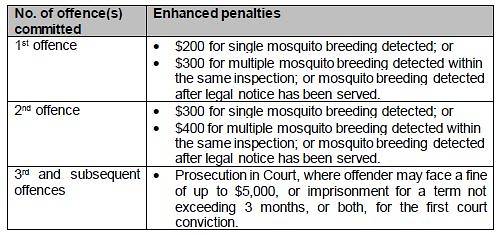SINGAPORE: Households with repeated mosquito breeding offences and multiple breeding habitats will soon face harsher penalties, after more than 1,000 weekly dengue cases were reported earlier this month.
Currently, households are issued a composition sum of S$200 for mosquito breeding detected at their residential premises, regardless of the number of breeding habitats detected, said the National Environment Agency (NEA) on Monday (Jun 22).
Offenders are sent to court for the fourth offence.
These will change starting Jul 15, said NEA in a press release.
First-time offenders will be penalised with a S$200 fine for a single instance of mosquito breeding, and S$300 for multiple breeding instances during the same inspection or mosquito breeding detected after a legal notice has been served.
Repeat offenders will also be given heftier penalties or sent to court.
The enhanced penalties are as follows:

(Source: NEA)
In homes specifically, there has been a “significant increase” in mosquito breeding, with the breeding incidence rates in homes up by 50 per cent in the last three years compared to in the preceding three years, said NEA.
There was a five-fold increase in the incidence of Aedes mosquito larvae detected in homes and common corridors at residential areas during the two-month-long COVID-19 “circuit breaker”, compared to in the two months prior.
“This is despite more people staying home and being in a position to upkeep their premises better, and comes after years of educational outreach on the prevention of mosquito breeding habitats at home,” said NEA.

Officer checking flower pots and plates at a residential home. (Photo: NEA)
“The majority of mosquito breeding is found in residential homes,” Minister for the Environment and Water Resources, Mr Masagos Zulkifli, said in the press release.
“Even as NEA continues to conduct home inspections and educate residents on what they can do to protect themselves and to prevent mosquito breeding at home, the number of dengue cases has continued to rise.
“This places about 325,000 households living in over 200 dengue clusters islandwide at higher risk of dengue transmission.”
READ: Weekly number of dengue cases in Singapore surpasses ‘historical high’
The composition sums will also be raised for mosquito breeding at construction sites, said NEA, adding that although there has been “steady improvement” in the number of mosquito breeding habitats detected at construction sites, they continue to be uncovered.
From Jul 15, first-time offenders will be fined S$3,000, up from the current S$2,000. Repeat offenders will also face more severe penalties.

(Source: NEA)
NEA said it will also tighten enforcement for town councils for mosquito breeding found in common habitats such as drains and gully traps.
Currently, town councils may be fined up to a maximum of S$5,000 for mosquito breeding detected in dengue cluster areas.

Officer checking drain at a residential home. (Photo: NEA)
READ: Spike in dengue cases: Why Singapore may see worst outbreak in years
MORE THAN 200 ACTIVE DENGUE CLUSTERS IN SINGAPORE
As of Jun 19, 254 active dengue clusters have been reported in Singapore, NEA said.
The five largest dengue clusters are located at Woodleigh Close, Leicester Road, Aljunied Road, Tampines Avenue 7 and Chu Lin Road.
Some dengue clusters also have a faster rate of dengue transmission, said NEA.
These include the 157-case cluster at Leicester Road, 146-case cluster at Aljunied Road, 120-case cluster at Potong Pasir Avenue 1, 115-case cluster at Broadrick Road and 91-case cluster at Bukit Panjang Ring Road, with an average of about two to four cases reported per day in the past two weeks.
While 904 out of the 1,158 dengue clusters notified have closed since the start of the year, there are some errant clusters.
“Repeated mosquito breeding is still being detected at residential premises at the Woodleigh Close and Aljunied Road dengue clusters,” NEA said.
“There are also premises with multiple mosquito breeding detected in common breeding habitats, such as pails, dish trays, containers and flower pot plates, despite NEA’s constant reminders in our outreach materials to check these common habitats.”
The agency said it will step up outreach efforts at dengue cluster areas, with volunteers and poster walkers augmenting such efforts. SG Clean Ambassadors will also distribute dengue prevention checklists at hawker centres, to reach out to the general community.
READ: Dengue cases this year could surpass 2013 peak unless urgent action taken: NEA
OVERALL DENGUE SITUATION IN SINGAPORE
The heavier penalties come after Singapore faced a weekly “historical high” earlier this month.
In the week ending Jun 13, the number of weekly dengue cases exceeded 1,000 – the highest number for the same period of the year since 2013 when the largest outbreak year was recorded in Singapore’s history, NEA added.
Ultra-Low Volume (ULV) misting at a residential home. (Photo: NEA)
As of Monday, there have been 12,542 reported dengue cases this year. At least 12 people have died from dengue in 2020, with the victims aged between 56 and 80.
“Vector control is a key strategy given that our population will continue to have low immunity and we have limited control over other factors, like warmer weather, which is conducive for the faster multiplication of the Aedes mosquito and dengue virus,” said NEA.
“There are three main components in the transmission of dengue: The dengue virus, the Aedes mosquito and the human host. Removing any one of these components will halt the spread of dengue.”
In anticipation of the surge in dengue cases this year, NEA has initiated several new efforts including enforcement and vector control measures.
At dengue clusters, there is continuous surveillance of Aedes mosquito populations through the deployment of Gravitraps, a regime of regular inspections of potential mosquito breeding habitats and removal of mosquito breeding sources through intensive search-and-destroy operations.
Gravitrap surveillance system monitors the Aedes mosquito population at residential areas, and has detected a 20 per cent increase in the Aedes aegypti mosquito population in May 2020, compared to in April 2020.




